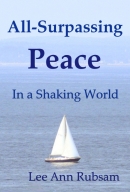In our previous three posts, we talked about the elements of biblical contemplative prayer, as well as nonbiblical things to avoid. Let’s recap and add to what we’ve already discussed.
Things to embrace:
- Meditate on the Lord — His nature, as revealed in His Word.
- Meditate on His Word — Savor it, repeat it aloud, pray it back to Him, declare it as your statement of faith. Again, if you need a plan for how to begin, go here.
- Meditate on His mighty deeds — as told in the Bible, from personal experience, or from the testimonies of other believers who have seen the Lord’s intervention on their behalf. Rehearsing testimonies of His previous faithfulness in your memory (and with your mouth) strengthens you to overcome your current challenges.
- Recall / meditate on / pray the personal promises the Lord has spoken to you. In 1 Timothy 1:18, the apostle Paul exhorted his young protégé, “This charge I commit to you, son Timothy, according to the previous prophecies regarding you, that you by them [those personal prophecies] might war a good warfare.”
- Converse with the Lord. Ask Him questions and give Him space to answer. Carry on a dialogue with Him.
- Ask the Lord what He wants to say, and then quietly listen. Invite Him, as young Samuel did, “Speak, Lord, for Your servant is listening” (1 Samuel 3:10).
- Write down whatever God speaks. This includes conversations you’ve had with Him and any other insights you receive from Him. Expect Him to expand on your revelation as you write down what you already have seen or heard. (See 1 Chronicles 28:11-19.)
Things to avoid:
- Eastern meditation practices, such as yoga, transcendental meditation, various Eastern relaxation and breathing techniques. These are purported to bring peace, through the emptying of the mind and by inducing an altered state of consciousness. Remember, peace is already available to you through the Holy Spirit, without these techniques. Peace is part of the fruit of the Spirit, not something achieved by our efforts. Ask the Lord to work peace in you. An empty mind is an open door to evil spirits. The Bible doesn’t speak of emptying our minds, or of employing special breathing disciplines. Instead, it talks about fastening our attention on the Lord and putting our trust in Him.
- Do not attempt to bring on a trance, vision, or altered state of mind. Trances are biblical — when God is the initiator (see Acts 10:9-16). But trying to induce a trance or vision for yourself will open you up to deception. You can ask God to give you these types of revelation, but from thereon, it is His prerogative, not yours. This goes for out-of-body, heavenly experiences, such as John experienced in Revelation and Paul received in 2 Corinthians 12:1-5. God initiated it; they did not.
- Do not try to reach a higher spiritual state by praying words or phrases repetitiously. Religious or mystical ritual will not bring you closer to the Lord. He is all about relationship, not ritualistic formulas for trying to reach Him. In Matthew 6:7, Jesus said, “But when you pray, do not use vain repetitions, as the heathen do: for they think that they shall be heard for their much speaking.” Notice that He calls them vain (meaningless; empty; useless) repetitions.
Is it always wrong to repeat a prayer request or worship / praise phrase? No, not if you are sincerely engaging with the Lord. The ritual is what we want to avoid. Sometimes in our worship or intercession, we go a little deeper each time we tell the Lord we love Him, or each time we plead a point. It is when we try to use repetition to achieve a different spiritual zone, or to coerce God with much speaking, that we cross over the line.
A good measuring stick of all spiritual practices is, if it’s not in the Bible, don’t do it. Stick with what we have good evidence of in the Word.
I hope this series has helped clear up some of the fear and misconceptions surrounding contemplative prayer. I have probably missed covering some spiritual practices which should be addressed. If you have questions or suggestions, please comment!
Contemplative Prayer (Part 1) — Meditation
Contemplative Prayer (Part 2) — Listening to God
Contemplative Prayer (Part 3) — Journaling
The Names of God,
by Lee Ann Rubsam
All-Surpassing Peace in a Shaking World,
by Lee Ann Rubsam



Lee Ann,
Excellent series! Truly benefitted from it.
In anticipation of the Lord’s resurrection : “Christ is risen! ” “Truly He is risen!”
Costa
LikeLike
Happy Resurrection Day, Costa! 🙂
LikeLike
Good morning Lee Ann
This was a very helpful summary of do’s and don’ts. Thanks for all your time and hard work and labor of love in putting these articles together.
“He is Risen!” 🙂
Dave
LikeLike
Thank you so much for reading at Out of the Fire, Dave. Happy Resurrections Day!
LikeLike